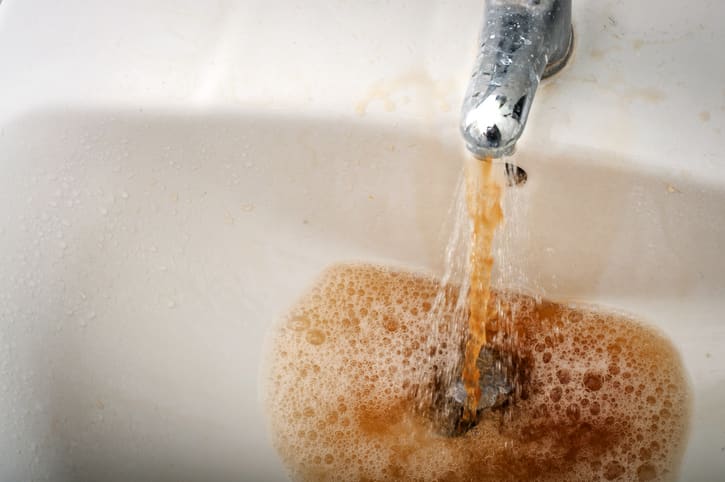
Have you ever filled a glass from your tap, expecting crystal clear water, only to find a murky brown liquid? The sight is enough to stop you in your tracks. While it’s not the most appetizing color, the good news is that brown water isn’t typically harmful to your health. That said, it’s not something you should ignore, either. So, why is your water brown, and what can you do about it?
Common Causes of Brown Tap Water
Your water was clear yesterday, but today, it’s brown. What gives? Several culprits could be to blame for your dilemma:
- Old pipes: Water travels through miles of pipes to reach your home, some of which might be made of old galvanized iron. As this material deteriorates, it can release rust and other minerals into your water supply, leading to that unsightly brown color. The pipes within your home could also be to blame. If they’re old or damaged, they could be sending sediment straight to your faucets.
- Pressure changes: Significant changes in water pressure from temperature shifts, fire hydrant use, or city maintenance work can stir up sediment, leading to a sudden appearance of brown water.
- Rusty water heater: If the discoloration only affects the hot water, investigate your water heater. Inside is a sacrificial anode rod designed to keep rust at bay. But once it’s spent, rust will start accumulating inside the tank. Before you know it, you’re filling your bathtub with rusty water that looks like it came from a muddy riverbank.
- Heavy rains affecting well water: If you live in a rural area and source your water from a well, be on the lookout for heavy rain. When rain infiltrates your well, it brings dirt, debris, and bacteria with it, a cocktail you definitely don’t want in your drinking glass.
Is Brown Water Bad for You?
Iron, a common cause of brown water, is naturally found in soil and usually present in your water in harmless amounts. Brown tap water usually constitutes high iron content, which is not usually a health concern.
It’s important to note, though, that excess iron in the water could be hazardous for individuals with certain medical conditions, like hemochromatosis, which causes the body to store excess iron. However, for the vast majority of people, the iron in brown water isn’t absorbed in large enough quantities to cause a problem.
Still, brown water is not something to shrug off. When the concentration of iron increases, it can lead to a slew of unwanted issues, such as:
- Unappetizing appearance: When hosting a nice dinner party, the last thing you want is to serve glasses full of unappealing brown water. It’s enough to make anyone lose their appetite.
- Metallic taste and smell: Most people want clean, fresh-tasting water. Rusty brown water often has a distinct metallic taste and odor that may make you crinkle your nose in disgust and pour the water down the drain.
- Staining: Brown water can stain your laundry and leave unsightly marks on your sinks, bathtubs, and toilets. Imagine the chore of scrubbing iron stains from your porcelain fixtures on a regular basis, a task no one would envy.
- Damage to appliances and fixtures: The continuous flow of brown, rusty water can cause sediment to accumulate in your plumbing appliances and fixtures, potentially shortening their lifespan.
How to Get Rid of Brown Water
So, what do you do when faced with brown water from the tap? First, don’t panic. In many cases, this is temporary and can be resolved with a few simple steps:
- Run cold water from your tap for 20 minutes to flush out sediment that has been dislodged from your pipes. In most cases, this is enough to resolve the issue.
- Check with your neighbors. Are they experiencing the same problem? If so, the issue might lie with the city’s water system rather than your home’s plumbing. Call your local utilities department to confirm whether they know about the issue and if they have a repair timeline.
- Consider installing a water filtration system to improve water quality. These systems remove iron particles and other contaminants, ensuring your tap water is clean and clear. If your water comes from a well, a specialized filtration system may be necessary to handle the elevated iron content.
- Flush the water heater to remove sediment from the bottom of the tank. If your hot water remains brown despite your efforts, the tank itself could be rusting. Consider replacing it before the tank rusts through and causes property damage.
- Look into repiping your home if your pipes are aging and rusty. This is probably your best bet if you determine that the city’s pipes and your water heater are in the clear. You can count on new pipes to be appropriately sized and made of quality materials that stand the test of time.
When to Call the Pros
If these troubleshooting tips don’t clear up the brown water, it’s time to seek professional help. A trusted plumbing service should be able to diagnose the problem and offer a permanent, cost-effective solution. Whether it’s a matter of high iron content or a rusty water heater, emergency plumbers have the tools and expertise to handle the issue efficiently and effectively.
Puget Sound Plumbing and Heating is the clear choice for tackling brown water. With over 20 years of experience, our family-owned business is available 24/7 for emergency plumbing in Seattle. Our skilled and fully licensed plumbers deliver unbeatable work, ensuring a positive customer experience every time. Quality service at a fair price is our promise to you. So, the next time you need reliable plumbing services, don’t hesitate to call (206) 938-3219 or contact us online.


